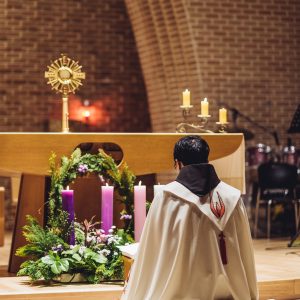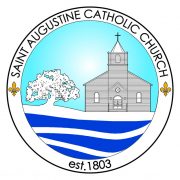Ministries
Liturgical Ministries

Altar Servers
From early time, the ministry of the altar server has occupied an important place in the liturgical life of the Church, particularly in the Liturgy of the Eucharist. In accord with the authentic interpretation of Church law given by the Apostolic See, the Church welcomes both men and women, some younger and some older, to the ministry of service at the altar.
Qualification:
-Baptized Catholic who have received their sacrament of First Communion.
-Mature enough to understand and carry out responsibilities (usually means 5th grade or higher)
-Regular attendance at Sunday Mass
-Prayerful attitude and ability to be flexible
Responsibilities:
-Preparation of the altar before Mass (in conjunction with the Sacristan)
-Cross bearer, candle bearer, incense bearer
-Holding Roman Missal and other ritual books for the clergy
-Preparation of the altar during the Presentation and Preparation of the Gifts
If you are interested in becoming an Altar Server for the parish, training is required. Please contact Tiffany Roque at 318.

Ministers of Hospitality - Greeters and Ushers
The Ministry of Hospitality is truly a service to the Church and should be treated seriously and with great dignity. Therefore, Ministers of Hospitality should have an understanding of the Liturgy in order to be effective in providing the faithful with the proper environment. In addition, the following attributes will assist the ministers of seeking Jesus’ face in the face of each and every person who comes into the church: patience, reverence, sensitivity compassion, understanding, gentleness, embracing a sense of the family gathered as the Body of Christ. Your participation in the Ministry of Hospitality should be a direct reflection of your own prayer life which is nurtured by the Word of God and reception of Holy Eucharist thereby imbuing within you a spirit of dignity and respect.
The Greeters provides a warm welcome to families and adults, greet visitors and prospective new parishioners at all Masses.
The Ushers seats those assembled for Liturgy and especially taking special efforts to seat the faithful during the natural breaks in the Mass; and circulate the collection offering.
If you are interested in this ministry, please join us when training is conducted.

Eucharistic Ministers
Extraordinary Ministers of Holy Communion is nominated by the Pastor and approved by the Diocesan Bishop. Click Learn More below regarding:
Articles of Diocesan Policy, Article 6400 – Extraordinary Ministers of Holy Communion
If you are interested, please contact the Pastor.
Advisory Councils

Building Committee
The building committee is filled with volunteers who assist the pastor as requested. If you are interested in joining the building committee, please contact us.

Finance Council - Meet Quarterly
Diocesan Policy
Article 5200 • Parish Finance Council
1. Constitution and Purpose
1.1. Each parish including those that do not have a resident pastor is to have a parish finance council.
1.2. At canon law, the duly appointed pastor (or his equivalent, e.g., a parochial administrator) is the person directly entrusted with the management of the parish. He serves as the secretary of the parish corporation at civil law and presides over meetings of the parish finance council. Except where noted in law the pastor is free to act on his own accord. A pastor acts invalidly if he does not listen to his finance council when either universal or particular law requires its counsel or consent.
1.3. The parish finance council is concerned primarily with the budget, financial status, and business practices of the parish. It advises the pastor on major expenditures and other financial matters, and when the law demands, approves or disapproves of them. It further advises the pastor on investments, markets, and parish financial goals. It does not conduct or supervise the daily administration of the parish.
1.4. The parish finance council exists only when it is legitimately meeting; it does not exist and cannot act independently of the pastor. It cannot meet without the pastor presiding or at least without his permission. If he is not present at a meeting, the finance council’s recommendations must be presented to him in written form.
1.5. If a parish has mission churches or their equivalent in law, the pastor determines how the parish finance council represents them. He may establish a distinct council for each mission, appoint representatives from each mission to the finance council, or establish some other method of representation which better suits the local situation.
1.6. The parish finance council shall meet at least quarterly but may meet as often as the pastor deems necessary
1.7. The pastor shall convoke all the members of the council thirty-six (36) hours prior to any meeting by a means of personal communication directed to their residences or places of business. The convocation of all members is required for a valid meeting unless all members are de facto present.
1.8. The parish finance council may establish its own by-laws but may not act contrary to these Articles of Diocesan Policy or other ecclesial laws.
1.9. The pastor or the chair of the parish finance council may conduct its meetings in accord with any rule of order, but if there is a dispute, canons 113-128 and 164179 of the Code of Canon Law supersede those rules of order and become applicable both in elections and in any recommendations made to the pastor.
2. Membership and Function
2.1. The Parish Trustees
2.1.1. Each civil parish corporation must have two lay persons who are legally appointed by the bishop as corporate trustees.
2.1.2. A trustee must be a registered member of the parish or one of its missions.
2.1.3. Appointments begin on July 1 and end on June 30. A trustee is appointed to a two year term, which is renewable once. A full two years must elapse before another term may be served. Trustees who fill a partial term vacancy must not have served in that office for at least two years. After completing the partial term, they may serve two more consecutive terms unless the partial term lasted more than six months.
2.1.4. The pastor nominates trustees by submitting names to the bishop well in advance of the ending of terms for current trustees.
2.1.5. All trustees must attend a diocesan financial workshop within one year of appointment.
2.1.6. Both trustees are ex-officio members of the parish finance council with voting privileges.
2.2. Members of the parish finance council should be Catholics who are registered members of the parish, but this is not required. They should be well respected in the community, outstanding in personal character, and have some specialized knowledge of finance, civil law, or some other field which will assist the pastor in making financial decisions for the parish. Members may be elected or appointed without prejudice to gender, socioeconomic background, or ethnicity. Members must not be related to the pastor, the parochial vicar, or the diocesan bishop. Members must also be willing to serve on the council and to participate in diocesan training seminars or other events which may be required from time to time.
2.3. Officers of a parish finance council shall include a chairperson who must have attended diocesan training or have completed it within one year of election. The chair usually conducts the meetings. Other officers may be a vice chairperson and a secretary. These may constitute with their proper pastor an executive committee.
2.4. The diocesan bishop can grant exceptions to the norm that members of the parish finance council are not to be voting members of the parish pastoral council.
2.5. At the pastor’s discretion, anyone, even a non-Catholic, may audit meetings of the parish finance council or the parish pastoral council and may submit recommendations to the council. Formal votes, however, are limited to members with voting privileges.
2.6. Members are typically appointed by the pastor for a term of five years. They may be reappointed for five further years. At the end of the second term, a hiatus of at least one year is required. New terms begin on the first day of the fiscal year and terms expire on the last day of the final fiscal year of the appointment. Terms should be staggered.
2.7. Beyond those appointed by the pastor, the council includes ex-officio members who do not have the right to vote. These include the proper pastor and those assigned to ecclesial office by the diocesan bishop, e.g., parochial vicars, deacons, etc.
3. Responsibilities
3.1. The agenda for each meeting should be formulated by the pastor in consultation with the executive committee or officers of his finance council. The agenda should provide ample opportunity for items which the pastor wishes to present as well as those which the members wish to present.
3.2. Formal recommendations of the parish finance council should be submitted to the pastor in writing for his consideration. He in no way is obliged to accede to its recommendations, but he should not lightly disregard them or act contrary to a consensus unless there is a serious reason, in his judgment, that justifies such an action.
3.3. The members of the finance council hold the pastor, parish employees, parish volunteers, and other members of the parish accountable for the good operation of the parish. If situations occur which raise significant questions about the competence or prudence of any of these decision-makers, the pastor should be consulted. If after dialogue with the pastor, there is failure to follow sound business practices, each member of the parish finance council is personally responsible to make the facts known in writing within one week to the proper dean with a copy to the diocesan bishop. Whoever makes such a report is acting fully within his or her rights. No reprisals of any kind shall be taken against this person or any other participant in this process including employees.
3.4. The parish finance council has the special obligations and rights to
3.4.1. review and analyze parish financial reports, bank statements, and other financial documents;
3.4.2. review and analyze reports and plans created by the parish pastoral council prior to their implementation and to advise the pastor on financial matters associated with them;
3.4.3. assist in preparing an annual budget and submit it to the pastor and parish pastoral council;
3.4.4. advise the pastor on all parish investments and help clarify parish financial goals;
3.4.5. advise the pastor on legal or practical matters regarding wills, bequests, contracts, taxes, banking, warrantees, etc.;
3.4.6. assist in developing guidelines, job descriptions, instruments of evaluation, pay scales, and other associated documents for parish employees and volunteers;
3.4.7. ensure that all of financial requirements listed in these Articles of Diocesan Policy are followed;
3.4.8. ensure that financial disclosure statements required by Articles of Diocesan Policy are adequately published or mailed to parishioners and school families, that they are reviewed and considered by the parish pastoral council, and, if applicable, the school board or its equivalent;
3.4.9. ensure that statements of deductible contributions as required by the IRS are sent to donors in January;
3.4.10. advise the pastor on all major projects and expenditures; 87 Articles of Diocesan Policy
3.4.11. assist the pastor when he is obliged to attend meetings of the diocesan finance council or the diocesan building review committee;
3.4.12. offer counsel and assist the pastor in fund-raising activities needed in the parish so that all its members can participate fully as stewards;
3.4.13. provide oversight on all construction projects; and
3.4.14. cooperate with diocesan legal personnel or their representatives.
3.5. The parish finance council also works to assist parish organizations which operate under the civil corporate identity of the parish or which enjoy taxexempt status by the annual group ruling in the development of their annual budgets and regularly reviews their financial reports. Nationally chartered organizations and organizations which are separately incorporated from the parish may request advice from the parish finance council with the pastor’s consent.
3.6. The parish finance council may always have recourse to the Diocesan Business Office or even the diocesan finance council on matters of greater importance. Typically, the pastor interacts with these entities. With his consent, representatives of the parish finance council may accompany or even represent him.
3.7. The parish finance council shall meet no less than quarterly. If after dialogue with the pastor, the Council fails to meet, there is failure to follow sound business practices or there is neglect of pastoral responsibilities, each member is personally responsible to make known the facts to the proper dean in writing with a copy to the Diocesan Bishop within one (1) week. Whoever makes such a report is acting fully within his or her rights. No reprisals of any kind shall be taken against this person or any other participant, including employees, in this process.

Pastoral Council - Meet Quarterly
Diocesan Policy
Article 5100
Parish Pastoral Council
1. Constitution and Purpose
1.1. Each parish, including those that do not have a resident pastor, is to have a parish pastoral council and a parish finance council. The parish pastoral council is the principal consultative body of the parish for the pastor, and all other boards, councils, and committees shall be responsible to it.
1.2. The parish pastoral council exists only when it is legitimately meeting; it does not exist and cannot act independently of the pastor. It cannot meet without the pastor presiding or at least without his permission. If he is not present at a meeting, the pastoral council’s recommendations must be presented to him in written form.
1.3. If a parish has mission churches or their equivalent in law, the pastor determines how the parish pastoral council represents them. He may establish a distinct council for each mission, appoint representatives to the council from 79 Articles of Diocesan Policy each mission, or establish some other method of representation which better suits the local situation.
1.4. The parish pastoral council shall meet at least quarterly but may meet more frequently, that is, as often as the pastor deems necessary.
1.5. The pastor shall convoke all the members of the council thirty-six (36) hours prior to any meeting by a means of personal communication directed to their residences or places of business. The convocation of all members is required for a valid meeting unless all members are de facto present.
1.6. The parish pastoral council may establish its own by-laws but may not act contrary to the Articles of Diocesan Policy or other ecclesial laws.
1.7. The pastor or the chair of the parish pastoral council may conduct its meetings in accord with any rule of order, but if there is a dispute, canons 113-128 and 164-179 of the Code of Canon Law supersede those rules of order and become applicable both in elections and in any recommendations made to the pastor.
2. Membership and Function
2.1. Members of the parish pastoral council should be Catholics who are registered members of the parish. They ought to be interested the spiritual growth of the entire parish and in overall parish-wide development.
2.2. Members may be elected or appointed without prejudice to gender, socioeconomic background, or ethnicity.
2.3. Members are typically appointed by the pastor for a term of three years. They may be reappointed for three further years. At the end of the second term, a hiatus of at least one year is required. New terms begin on the first day of the fiscal year and terms expire on the last day of the final fiscal year of appointment or election. Terms should be staggered.
2.4 Beyond the appointed and elected membership, the council consists of exofficio members who do not have the right to vote. These include:
2.4.1 the proper pastor,
2.4.2. those assigned to church office by the diocesan bishop, e.g., parochial vicars, deacons, etc.,
2.4.3. one officer of the finance council, and 80 Articles of Diocesan Policy
2.4.4. parish employees designated in writing by the proper pastor.
2.5. The pastor presides at meetings of the council, but the parish pastoral council is to have at least one officer, elected by the membership, who usually chairs the meetings. He or she has to attend a diocesan training seminar within a year of being named.
2.6. Other officers may include a vice-chairman and a secretary. These persons have the right to attend diocesan training seminars but are not required to do so. These officers, together with the chairperson and the pastor, may constitute an executive committee.
2.7. The agenda for each meeting should be formulated by the pastor in consultation with the officers of his parish council. The agenda should provide ample opportunity for items which the pastor wishes to present as well as for items which the members may wish to present for consideration.
2.8. While formal voting is limited to appointed and elected members only, the pastor may well choose to open attendance at the meeting to other individuals or even to the entire parish.
3. Responsibilities
3.1. The members of the council advise and cooperate with the proper pastor to foster prudent pastoral action.
3.2. Formal recommendations of the parish pastoral council should be submitted to the pastor in writing. He in no way is obliged to accede to these recommendations, but he should not lightly disregard them or act contrary to a consensus.
3.3. The members of the council hold the pastor, parish employees, parish volunteers, and other members of the parish accountable for the good operation of the parish. If situations occur which raise significant questions about the competence or prudence of any of these decision-makers, the pastor should be consulted. If he fails to act, concerned parishioners may contact (in this order) the local dean, the vicar general, and finally the diocesan bishop.
3.4. While immediate matters of concern constitute the majority of the parish pastoral council agenda, medium and long-range items should be considered, discussed, evaluated, and updated from time to time. The council’s on-going agenda includes but is not limited to:
3.4.1. Articles of Diocesan Policy Updating the parish’s written mission statement.
3.4.2.Evaluating and modifying the parish’s short-term, mid-range, and longterm goals, objectives, priorities, and pastoral plans regarding, for example, the liturgy, devotions and spiritual life, lay apostolate, evangelization, catechesis, faith community, social justice, vocations, fiscal policy, investments, physical campus, etc.
3.4.3. Reviewing at least annually the parish budget (as well as its investments and financial strategies) and making recommendations to the pastor with due regard for the Parish Finance Council which bears the primary responsibility for this activity.
3.4.4. Studying trends in Mass attendance, confessions, baptisms, marriages, funerals, missions, catechetical events, collections, and other statistical data which may shed light on the overall success of the parish.
3.4.5. Promoting meaningful dialogue, cooperation, and decision-making among the parish leadership (clergy, staff, and volunteers) and with parishioners.
3.4.6. Identifying concerns of parishioners.
3.4.7. Identifying and encouraging the use the gifts and talents of parishioners.
3.4.8. Assessing at least annually the function and performance of the council itself.
4. Meetings
The parish pastoral council shall meet no less than quarterly. If after dialogue with the pastor, the Council fails to meet, there is failure to follow sound business practices or there is neglect of pastoral responsibilities, each member is personally responsible to make known the facts to the proper dean in writing with a copy to the Diocesan Bishop within one (1) week. Whoever makes such a report is acting fully within his or her rights. No reprisals of any kind shall be taken against this person or any other participant, including employees, in this process.
